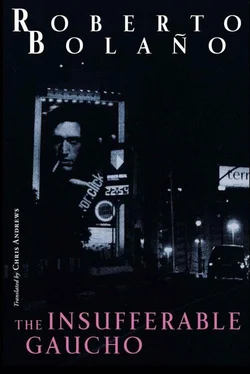Illness and Poetry
Between the vast deserts of boredom and the not-so-scarce oases of horror, there is, however, a third option, or perhaps a delusion, which Baudelaire indicates in the following lines:
Once we have burned our brains out, we can plunge
to Hell or Heaven — any abyss will do—
deep in the Unknown to find the new !
That final line, deep in the Unknown to find the new, is art’s paltry flag pitting itself against the horror that adds to horror without making a substantial difference, just as one infinity added to another produces an infinite sum. A losing battle from the start, like all the battles poets fight. This is something that Lautréamont seems to contradict, because his voyage takes him from the periphery to the metropolis, and his way of traveling and seeing remains cloaked in the most impenetrable mystery, so that we can’t tell if we’re dealing with a militant nihilist or an outrageous optimist or the secret mastermind of the imminent Commune; and it’s something that Rimbaud clearly understood, since he plunged with equal fervor into reading, sex, and travel, only to discover and accept, with a diamond-like lucidity, that writing doesn’t matter at all (writing is obviously the same as reading, and sometimes it’s quite similar to traveling, and it can even, on special occasions, resemble sex, but all that, Rimbaud tells us, is a mirage: there is only the desert and from time to time the remote, degrading lights of an oasis). And then along comes Mallarmé, the least innocent of all the great poets, who says that we must travel, we must set off traveling again. At this point, even the most naïve reader has to wonder: What’s got into Mallarmé? Why is he so enthusiastic? Is he trying to sell us a trip or sending us to our deaths with our hands and feet tied? Is this an elaborate joke or simply a pattern of sounds? It would be utterly absurd to suppose that Mallarmé had not read Baudelaire. So what is he trying to do? The answer, I think, is perfectly simple. Mallarmé wants to start all over again, even though he knows that the voyage and the voyagers are doomed. In other words, for the author of Igitur , the illness afflicts not only our actions, but also language itself. But while we are looking for the antidote or the medicine to cure us, that is, the new , which can only be found by plunging deep into the Unknown, we have to go on exploring sex, books, and travel, although we know that they lead us to the abyss, which, as it happens, is the only place where the antidote can be found.
Illness and Tests
And now it is time to return to that enormous elevator, the biggest I’ve ever seen, an elevator in which there was space enough for a shepherd to pen a smallish flock of sheep, or a farmer to stable two mad cows, or a nurse to fit two empty gurneys, and in which I was torn between asking the tiny doctor — almost as small as a Japanese doll — if she would make love with me, or at least give it a try, and (this was the likelier option) bursting into tears, like Alice in Wonderland, and flooding the elevator not with blood, as in Kubrick’s The Shining , but with salt water. This was one of those situations in which good manners, which are never redundant, and rarely a hindrance, did in fact hinder me, and soon the Japanese doctor and I were shut in a cubicle, with a window from which you could see the back part of the hospital, doing some very odd tests, which seemed to me exactly like the tests you find on the puzzle page of the Sunday paper. I was careful to do them as well as I could, as if I wanted to prove to her that my specialist was mistaken — a futile enterprise, because however perfectly I did the tests, the little Japanese doctor remained impassive: not even a tiny smile of encouragement. Between tests, while she was getting the next one ready, we talked. I asked her about the chances of success with a liver transplant. Vely good, she said. What percent? I asked. Sixty per cent, she said. Jesus, I said, that’s not much. In politics it’s absolute majolity, she said. One of the tests, maybe the simplest, made a big impression on me. It consisted of holding my hands out in a vertical position for a few seconds, that is, with the fingers pointing up, the palms facing her and the backs to me. I asked her what the hell that test was about. Her reply was that at a more advanced stage of my illness, I wouldn’t be able to hold my fingers in that position. They would, inevitably, curve toward her. I think I said: Christ almighty. Maybe I laughed. In any case, every day since then, wherever I happen to be, I take that test. I hold my hands out, palms facing away, and for a few seconds I examine my knuckles, my nails, the wrinkles that form on each phalange. The day when my fingers can’t hold themselves up straight, I don’t really know what I’ll do, although I do know what I won’t do. Mallarmé wrote that a roll of the dice will never abolish chance. And yet every day the dice have to be rolled, just as the vertical-fingers test has to be taken every day.
Illness and Kafka
Elias Canetti, in his book on the twentieth century’s greatest writer, says that Kafka understood that the dice had been rolled and that nothing could come between him and writing the day he spat blood for the first time. What do I mean when I say that nothing could come between him and his writing? To be honest, I don’t really know. I guess I mean that Kafka understood that travel, sex, and books are paths that lead nowhere except to the loss of the self, and yet they must be followed and the self must be lost, in order to find it again, or to find something, whatever it may be — a book, an expression, a misplaced object — in order to find anything at all, a method, perhaps, and, with a bit of luck, the new , which has been there all along.
These are dark times we live in, but let me begin with a buoyant declaration. Literature in Spanish is in excellent condition! Magnificent, superlative condition!
In fact, if it was any better I’d be worried.
But let’s not get too carried away. It’s good, but it’s not going to give anyone a heart attack. There’s nothing to suggest any kind of great leap forward.
According to a critic by the name of Conte, Pérez Reverte is Spain’s perfect novelist. I don’t have a copy of the article in which he makes that claim, so I can’t cite it exactly. As I recall, he said that Pérez Reverte was the most perfect novelist in contemporary Spanish literature, as if it were possible to go on perfecting oneself after having achieved perfection. His principal quality, but I don’t know if it was Conte who said this or the novelist Juan Marsé, is readability. A readability that makes him not only the most perfect novelist but also the most read. That is: the one who sells the most books.
But if we adopt that point of view, Spanish fiction’s perfect novelist could just as well be Vázquez Figueroa, who spends his spare time inventing desalination machines or desalination plants: contraptions that will soon be turning sea water into fresh water, suitable for irrigation, showers, and probably even for drinking. Vázquez Figueroa might not be the most perfect, but he certainly is perfect in his way. He’s readable. He’s enjoyable. He sells a lot. His stories, like those of Pérez Reverte, are full of adventures.
I really wish I had a copy of Conte’s review. It’s a pity I don’t collect press clippings, like that character in Cela’s The Beehive , who keeps an article that he wrote for a provincial newspaper, probably one of the Workers’ Movement papers, in the pocket of his shabby jacket — a likable character, by the way; in the movie, he was played by José Sacristán, and that’s how I always see him in my mind’s eye, with that pale helpless face, the incongruous face of a beaten dog, carrying that crumpled clipping around in his pocket as he wanders over the impossible tablelands of Spain. At this point I hope you’ll allow me to indulge in a pair of elucidatory digressions or sighs: José Sacristán, what a fine actor! His performances are so enjoyable, so readable. And Camilo José Cela, what an odd phenomenon! More and more he reminds me of a Chilean estate-holder or a Mexican rancher; his illegitimate children (as Latin Americans would politely say) or his bastards keep springing up like weeds: vulgar, reluctant, but tenacious and gruff, like candid lilacs out of the dead land, as the candid Eliot put it.
Читать дальше












